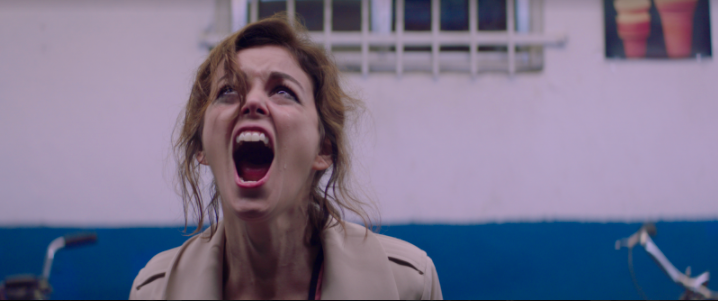“Love Sex Violence and Extraterrestrials:” Argo Interviews Amat Escalante We had a chance to interview Amat Escalante about his curated playlist on Argo. Amat Escalante is a 35-year old Mexican director, part of the generation redefining the horror, thriller genre. His feature film Heli earned him the award for Best Director at Cannes Film Festival in 2013. He was also awarded the Silver Lion for Best Director at the 2016 Venice Film Festival for his film The Untamed. Escalante is also the director of the second season of Narcos:Mexico (2020) Watch the playlist now on ARGO.

Heli (2013) earned Amat Escalante Best Director at Cannes Festival.

” At the heart of my interest is my love for the land and the people of my country”
ARGO: Is there a personal reason for which you make political films /social commentaries on the violence happening in your country? AMAT:I always blame my family for this. Both my parents are very socially conscious and have applied that to their work and/or life purpose. My father with his music and paintings, his father with poetry and music and so on. Also in a country like Mexico, I just don’t see what else to talk about. There is an urgency that instinctively compels me and inspires me to talk about injustice and social oppression: it’s in every corner and at every turn you look. At the heart of my interest is my love for the land and the people of my country, otherwise I think I would probably just be making some other kinds of films that have a more pleasant and tamed nature. ARGO: Do you think that the idea of silence preceding spoken word is overused in order to create tension in films? AMAT: It’s a difficult question because when something works, it’s good and always feels fresh; and, when it doesn’t, it falls flat and can seem overused and wrongfully placed. There has been a tendency for minimalism, especially in some young filmmakers inspired by the great masters. Masters could seem minimalist, but really there is so much more there. That the form needs so little gives the illusion of minimalism or sparsity. I am thinking of course of Bresson, Akerman or James Benning. I consider all three as major influences, and all three use a form of tension that I can only think of and find in cinema; so, that is a beautiful thing and will never be overused. If this kind of technique comes from a person that only understands the surface of things, then it will be shallow, frustrating and probably not suspenseful. It is alway a very delicate and unarticulated reason when things finally do work and elevate to something close to magic or miracle on film. This is what good films do.
“A major part of our innate and human conflict comes from sexuality and desire…At the end, we are all here because two people had sex. “
ARGO: We would like to hear your thoughts on human sexuality — Do you find humans, generally, to be civil in their need to satisfytheir pleasure. Why are all your characters so sexually driven? AMAT:I like to believe that when I explore a subject and a character I tend to remove layers – layers that normally shield us and help us fit into our place in the world easier, with less conflict one could say. If we want conflict, usually we just need to see it in a film or read it in a book. But when all is said and done, l think a major part of our innate and human conflict comes from sexuality and desire. Many of our decisions could be traced back to this, so I tend to gravitate towards it when I look for my characters’ motivation. Sexuality is such a big and beautiful mystery. It is creation. It is what makes us creators in the most basic sense. At the end, we are all here because two people had sex. So it just seems very basic and at the same time mysterious to explore this in my characters and stories.
ARGO: Who is the character in your films that you found most difficult to build up psychologically? and why? AMAT: Probably Jesus and Fausto, the two immigrants in Los Bastardos. In part, it was because of my idea to cast real immigrants that had really suffered in the same way as my characters in the film, something I have personally not gone through. So in some way, my experiment was for my characters to just show themselves as they are and show us their story by who they are. I then placed them in a very fictionalized world with a story to play out, and the result is Los Bastardos. They are there not as characters that I made up, but as two guys that had gone through real suffering which showed in their bodies, eyes and voice.
ARGO: What has been your favorite part about filming Narcos? What drew you to taking on the project? AMAT:I was attracted to the offer because it meant working in a more Hollywood scheme but at the same time staying in Mexico. I had never worked in such a major production, and this was also exciting to me (working with professional actors and a top level crew etc.) Also the subject matter is something that I am very drawn to. The power and money that is driving such major parts of Mexican life – it’s scary and amazing at the same time. ARGO: What directors do you admire or take from? AMAT:It would have to be a very long list. But I will be as brief as I can. The first ones were Charlie Chaplin, Stanley Kubrick and Werner Herzog, then came R.W. Fassbinder, Chantal Akerman, Andrei Tarkovsky, James Benning, Keneth Anger, Maya Deren, Robert Bresson, Martin Scorsese, Luis Buñuel, Alejandro Jodorowsky, Dario Argento, Gaspar Noé, Bruno Dumont, Harmony Korine, Vincent Gallo, Lisandro Alonso and Carlos Reygadas. I could really keep going but will stop at that.












